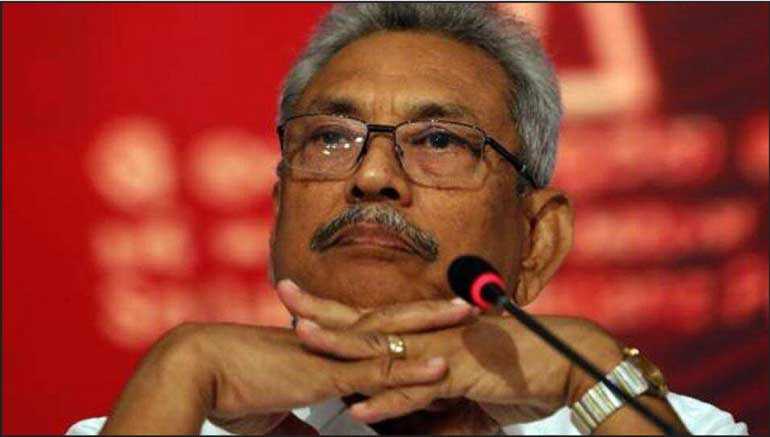Friday Feb 13, 2026
Friday Feb 13, 2026
Friday, 17 April 2020 00:00 - - {{hitsCtrl.values.hits}}

A great deal of confusion appears to have been created following the proclamation issued by the President on 2 March dissolving Parliament, amid the global coronavirus outbreak, and fixing the date  of the General Election for 25 April and the first meeting of the new Parliament for 14 May.
of the General Election for 25 April and the first meeting of the new Parliament for 14 May.
The confusion appears to have been compounded by the request made to the President by the Election Commission that, in view of its inability to hold the General Election on the date specified by the President, the latter should seek the advice of the Supreme Court on how to proceed in the matter.
The confusion has been further compounded by the reply of the Secretary to the President that it is the responsibility of the Election Commission to fix a new date for the general election and that, therefore, the question of a reference to the Supreme Court does not arise. It is unfortunate that neither the Election Commission nor the Secretary to the President appear to have paid any attention to the relevant laws governing this matter.
Under Article 62 of the Constitution, unless sooner dissolved, the Parliament continues for five years from the date appointed for its first meeting (which, I believe, was 2 September 2015), and the expiry of that period operates as a dissolution of Parliament. However, under Article 70 of the Constitution, the President may dissolve Parliament at any time after the expiration of four years and six months from the date of that first meeting.
Accordingly, acting under that Article, the President by Proclamation dissolved Parliament on 2 March. As required by Article 70(5)(a), the Proclamation fixed 25 April as the date for the General Election of Members of Parliament, and May 14 as the date of the first meeting of the new Parliament, since the Constitution requires the date of the first meeting to be not later than three months after the date of the Proclamation dissolving Parliament, i.e. 2 June. This signifies a fundamental principle of democratic governance that the country should not remain without an elected Parliament for a period in excess of three months.
If, in view of the indefinite 24-hour curfew that was imposed in many provinces on 20 March, and still continues to this day (11 April), the Election Commission was of the view that it was unable to conduct the General Election on 25 April, the proper course for the Commission would have been to inform the President accordingly. It made no sense whatsoever to request the President to invoke the consultative jurisdiction of the Supreme Court and to seek the opinion of five Judges of that Court on how the conundrum should be resolved.
President has two options
The President who made the Proclamation is the only authority vested by law to resolve this issue. He has two options. One is to review his decision to order the premature dissolution of Parliament and  revoke his Proclamation in view of the global pandemic which has struck Sri Lanka as well. The other is to amend his Proclamation by fixing a date in the final week of May for the General Election bearing in mind that the first meeting of the new Parliament cannot be later than 2 June. The reply of the Secretary to the President, as reported in the media, demonstrates an incredible lack of understanding on the part of his legal advisers not only of the relevant constitutional provisions, but also of the law relating to parliamentary elections. He is reported to have informed the Election Commission that “fixing the poll is the responsibility of the Election Commission”. He is also reported to have informed the Election Commission that it had “failed to act under section 24(3) of the Parliamentary Elections Act and published another date for the general election”.
revoke his Proclamation in view of the global pandemic which has struck Sri Lanka as well. The other is to amend his Proclamation by fixing a date in the final week of May for the General Election bearing in mind that the first meeting of the new Parliament cannot be later than 2 June. The reply of the Secretary to the President, as reported in the media, demonstrates an incredible lack of understanding on the part of his legal advisers not only of the relevant constitutional provisions, but also of the law relating to parliamentary elections. He is reported to have informed the Election Commission that “fixing the poll is the responsibility of the Election Commission”. He is also reported to have informed the Election Commission that it had “failed to act under section 24(3) of the Parliamentary Elections Act and published another date for the general election”.
Section 24(3) of the Parliamentary Elections Act states that “where due to any emergency or unforeseen circumstances the poll for the election in any electoral district cannot be taken on the day specified”, the Election Commission “may by Order published in the Gazette appoint another day for the taking of such poll”. It refers to unforeseen circumstances in “any electoral district”. Such circumstances could include a flood, a cyclone, or even the prevalence of a serious infectious disease in that district. The authority granted to him is to change the polling date in the affected electoral district.
Section 24(3) cannot surely be interpreted to mean that the Election Commission has the power to change the date of the General Election as proclaimed by the President. The power to determine when to dissolve Parliament, the power to determine the date of the General Election, and the power to decide the date of the first meeting of the new Parliament are powers that are vested in the President by the Constitution and cannot be delegated to, or arrogated by, another individual or body.
Do not create unconstitutional precedents contrary to law
It is important that those in positions of authority today, whether driven by political expediency or lack of proper understanding, do not create precedents that are unconstitutional and contrary to law.
When the Secretary to the President directed the Election Commission to act in excess of its powers and usurp the President’s constitutional duty and determine a new date for the General Election, it is pertinent to ask whether he was aware that under Article 104A of the Constitution, no Court has the power or jurisdiction to “entertain or hear or decide or call in question on any ground and in any manner whatsoever any decision, direction or act of the Commission made or done or purported to have been done” under any law relating to the holding of an election.
It is an invitation to a future Election Commission to override a future President’s proclamation fixing the date of a future General Election and substitute a new date perhaps more favourable to an opposition political party.
It has been suggested in some quarters, obviously in error, that the President could act under section 113 of the Parliamentary Election Act. That section states that “If at any time after the President has ordered or fixed the date for an election, it is shown to his satisfaction that in any electoral district owing to any cause whatsoever no election has been held in pursuance of such Order, he may at any time by notice in the Gazette issue another Order that an election shall be held in that district.”
This section relates to certain transitional provisions in the Constitution concerning the “First Parliament”. When a vacancy occurred in that Parliament (which was elected in 1977 under different electoral arrangements), and the secretary of the relevant political party failed to nominate a member to fill that vacancy within the prescribed period as required in the transitional provisions, the President was required to “Order” the Commissioner of Elections to hold an election for the relevant electoral district. An “Order” is different from a “Proclamation” and has no applicability to the current situation.
Remedy lies with the President
Common sense appears to dictate that it would be extremely irresponsible, during the current global pandemic, when several provinces are still under an indefinite 24-hour curfew, to contemplate holding a General Election within the next few weeks, in 22 districts, to elect 225 members, preceded necessarily by intense canvassing.
The remedy lies not with the Election Commission but with the President who alone has the power to revoke any Proclamation he has already issued, and to exercise his power of dissolution, preceded if necessary by the exercise of his power of prorogation, at a more appropriate time when the waves of COVID-19 have finally receded.